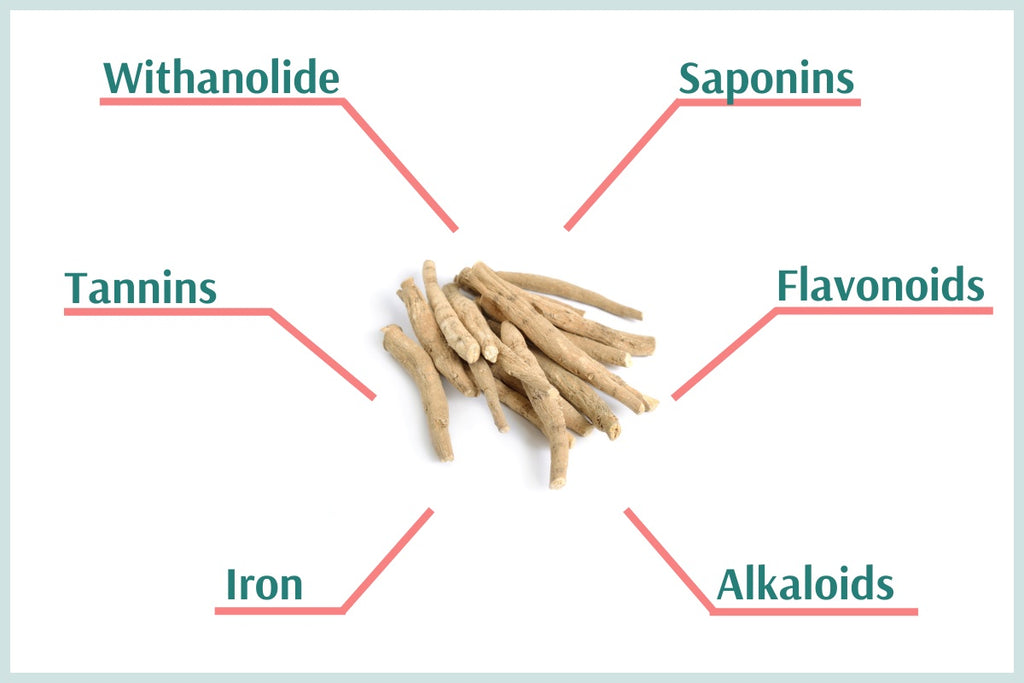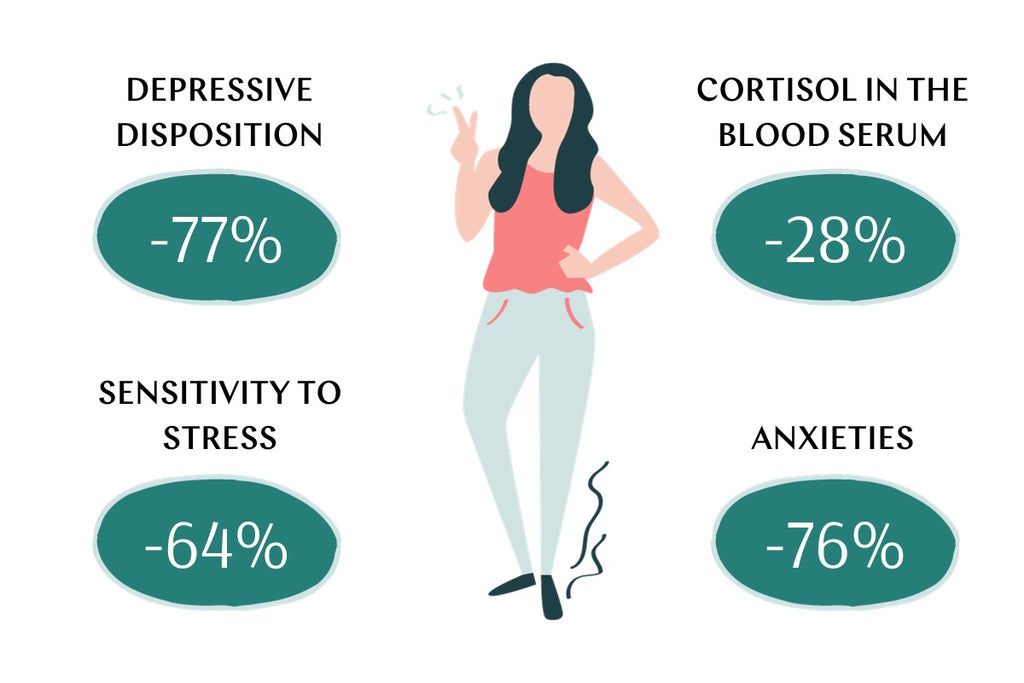Health Benefits of Ashwagandha

Ashwagandha or “Indian ginseng”, contains versatile adaptogens, making it a wonderful antidote for women experiencing midlife challenges such as menopause and hormonal imbalances. In this article, we give you a comprehensive overview of some of its most important benefits.
Ashwagandha is the queen of Ayurvedic herbs. It has been used for its calming effects in traditional Indian medicine, Ayurveda, for over 3,000 years. In Ayurveda, ashwagandha is used in many different ways, for example to boost energy levels, reduce stress and anxiety and to treat insomnia, infertility and even diabetes. Its traditional use to treat sleeping problems explains its nickname "sleep berry." Ashwagandha is also known as the "winter cherry" or by its botanical name, “Withania somnifera”.
Ashwagandha is a wonderful plant extract for women in midlife. The following provides an overview of the various health benefits of ashwagandha and ideas for incorporating the "queen of herbs" into your daily life.
What is Ashwagandha?
Ashwagandha is a herbaceous plant that grows 30 to 150 cm tall. It is mainly found in Africa, India, the Middle East, South Asia and China. The plant's red berries are inedible due to their high alkaloid content. In Ayurveda, only the root, leaves, stems and shoots are used.
The name ashwagandha stems from the roots and gives us a clue to what it smells like. In Sanskrit, “ashva” means horse and “gandha” means smell. It's believed that when you take the plant as medicine, you will have the strength of a horse. The roots of the ashwagandha plant contain compounds called withanolides, which are primarily responsible for the effects of ashwagandha.

Ashwagandha contains various nutrients and bioactive substances.
What does Ashwagandha do?
Ashwagandha is an adaptogen. Adaptogens are bioactive plant compounds that help the body adapt, or adjust, to stressful situations like the hormonal changes that occur during menopause.
In traditional Ayurveda, ashwagandha is used in many different ways. Some of its traditional applications include treating:
- Sleep difficulties
- Anxiety
- Infertility
- Concentration and memory problems
Modern medicine has also studied the benefits of ashwagandha. A review in 2000 compiled and evaluated numerous studies on ashwagandha. The study's authors attributed the following properties to ashwagandha:
-
Anti-inflammatory
-
Immunomodulatory
-
Hematopoietic (promoting blood formation)
-
Antitumor
-
"Rejuvenating" by increasing DHEA levels (the "anti-aging hormone")
The study also shows that ashwagandha can have positive effects on hormones, the cardiovascular system and the nervous system.
Let's look at the studies that have suggested six benefits of ashwagandha:
#1 Ashwagandha reduces stress, anxiety & improve sleep
Ashwagandha works adaptogenically, meaning it helps the body adapt to stressful situations. Ashwagandha also helps to rebalance the nervous system and promotes calmness and clarity of the mind in Ayurveda. This can be particularly helpful in cases of overexertion and chronic fatigue. The calming effect of ashwagandha helps alleviate anxiety and provides stress relief.
In a double-blind study, 98 participants took either 125mg or 250mg of ashwagandha twice daily. The goal was to reduce stress-related parameters. And that's exactly what happened: inflammation markers in the blood decreased, as did heart rate and blood pressure. This study is particularly interesting because it focused not only on the subjective perception of stress, but also on the physiological effects of stress on the body.
Another study involving 64 individuals who took 2 x 300mg of highly concentrated ashwagandha daily for two months also showed a reduction in stress factors. The participants reported feeling less stressed and their depression and anxiety decreased. In this study, the participants' levels of the stress hormone, cortisol, also decreased, demonstrating ashwagandha's direct benefits for the body.

Study Result: The Effect of Ashwagandha Extract on Stress and Anxiety in Adults - Measured using the DASS questionnaire (Lovibond and Lovibond, 1995) and analysis of cortisol levels in blood serum before and after 60 days of daily intake of 600mg of ashwagandha extract.
In another study, daily intake of 500 to 600mg of ashwagandha for 6 to 12 weeks reduced anxiety and the likelihood of insomnia in individuals with stress and anxiety disorder s. The adaptogen ashwagandha appears to help lower cortisol levels.
An eight-week randomised controlled study examined the effect of ashwagandha on sleep. Eighty participants were divided into four groups: Group 1 + 2: One part of the participants without sleep disorders received ashwagandha, while the other received a placebo. Group 3 + 4: One part of the participants with diagnosed insomnia received ashwagandha, while the other received a placebo. Both ashwagandha groups showed a reduction in sleep onset latency, an increase in total sleep time, an improvement in sleep quality and mental alertness upon waking.
#2 ALLEVIATE DEPRESSION
Some studies suggest that ashwagandha may help alleviate depression. In a 60-day study involving 64 stressed adults, those who took 600mg of ashwagandha extract daily reported a 79% reduction in their depressive mood. Since the study participants had a history of depression, the study has limited generalisability, meaning that the study's findings and conclusions may not be applicable or relevant to a broader population or other settings. Further studies are needed.
#3 THYROID GLAND AID
People who have hypothyroidism or Hashimoto's disease may also benefit from taking ashwagandha. In one study, participants with subclinical hypothyroidism received 600mg of ashwagandha root extract daily for eight weeks. It was found that ashwagandha significantly improved the serum levels of thyroid hormones TSH, T3 and T4.
#4 LOWER BLOOD SUGAR
A study on the blood sugar-lowering, blood pressure-lowering and cholesterol-reducing effects of ashwagandha root confirmed these effects in 12 subjects after 30 days of intake. The reduction in blood sugar levels was comparable to that of an oral blood sugar-lowering medication. A significant decrease in blood cholesterol and triglyceride levels was also confirmed.
#5 REDUCE INFLAMMATION
Several animal studies have shown that ashwagandha can reduce inflammation. Studies in humans have also found that ashwagandha increases the activity of natural killer cells, which support the body in fighting against pathogens. Inflammatory markers such as C-reactive protein, an important indicator in cardiovascular diseases, were also reduced. (Read an overview of the studies here.)
#6 IMPROVE MEMORY
In Ayurveda, ashwagandha is traditionally used to promote memory. However, studies on this topic are not yet significant enough to draw clear conclusions. In a small study that lasted eight weeks, daily intake of 2 x 300mg extract of ashwagandha root improved overall memory, attention and task performance.
Ashwagandha – Benefits for females
Ashwagandha is a popular choice for women due to its balancing and calming effects. In particular, it can help to address common challenges that women face during midlife like hormonal imbalances and menopausal symptoms. These include:
-
Balancing stress and anxiety: Several studies have confirmed that ashwagandha has a positive effect on stress. Ashwagandha can help restore the body's homeostasis. As an adaptogen, it aids in reducing cortisol levels.
-
Promoting sleep: Ashwagandha contains an active compound called Triethylene Glycol, which appears to promote sleep. This is likely why it is also known as the sleep berry. Studies (1, 2, 3, 4) have shown improvement in both stress reduction and sleep quality. If you want to take ashwagandha to improve your sleep or to help you fall asleep, it is best to take it in the evening, ideally combined with sour cherry juice. The reason for this is that sour cherry juice naturally contains the sleep hormone, melatonin.
-
Supporting the thyroid: Many people experience troubles with their thyroid glands during menopause. Ashwagandha helps to improve thyroid function.
Enhancing libido: In a small study, 50 women aged 25 to 50 who took 2 x 300mg of ashwagandha daily for eight weeks experienced a positive effect on their libido. They reported feeling increased sexual desire.
-
Breast cancer and more: Animal studies suggest that ashwagandha may help to treat various types of cancer, including breast cancer. However, more research is needed.
How much Ashwagandha should I take per day?
The typical recommended dosage is to consume 3 to 6g of dried root or 300 to 500 mg of extract containing 5% withanolides. That´s the reason why we use KSM-66 in our XbyX Take it easy. When aiming for mental relaxation, promoting better sleep, or addressing sleep disorders and difficulties with falling asleep, a higher dosage of 2 x 300mg or a single intake of 600mg is often advised.
When Will I Feel the Benefits of Ashwagandha?
As is the case with any herbal remedy, it may take some time before you start to notice or feel the effects. For this reason, it is recommended to take ashwagandha daily for two to three months.
What are the Side Effects of Ashwagandha?
Ashwagandha rarely causes side effects. Studies have shown that ashwagandha is well tolerated. However, in excessive doses, it may cause abdominal pain, nausea, headaches or diarrhoea.
Is Ashwagandha safe?
If you are pregnant or breastfeeding, you should not take ashwagandha. Consult a doctor if you have autoimmune diseases like rheumatoid arthritis, lupus and/or Hashimoto's thyroiditis. The same goes for people taking thyroid hormone medication, since ashwagandha can affect thyroid hormone levels.
Incorporating Ashwagandha into your Daily Routine
It's easy to incorporate ashwagandha into your daily diet especially when it comes in powder form. Using the roots can be a little trickier. Have you tried our plant extract powder, Take It Easy that contains ashwagandha? We've also compiled some easy and delicious recipes for you to try, like our Watermelon and peach smoothie or the Sweet slumber with golden milk.
To Sum up
Ashwagandha is a plant with diverse health benefits. It has been traditionally used in Indian Ayurveda to improve blood sugar levels, inflammation, immune system function, sleep quality, mood, memory performance, stress, anxiety and even to enhance muscle strength and libido.
While there are numerous studies supporting some of these effects, the definitive evidence is still limited for others. The strongest evidence for ashwagandha lies in its ability to rebalance the body, calm the mind and reduce the impact of mental, emotional and physical stress.




















